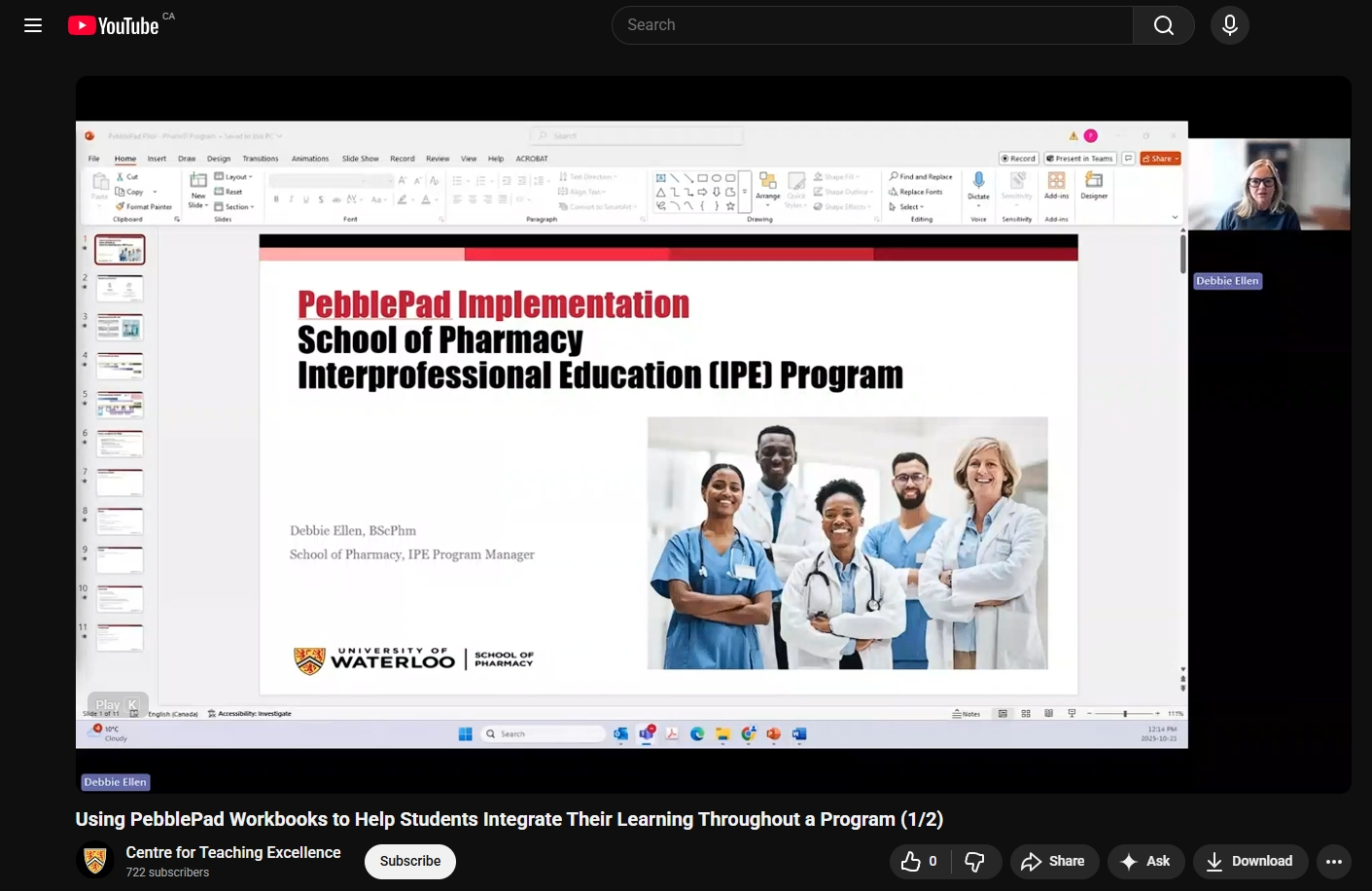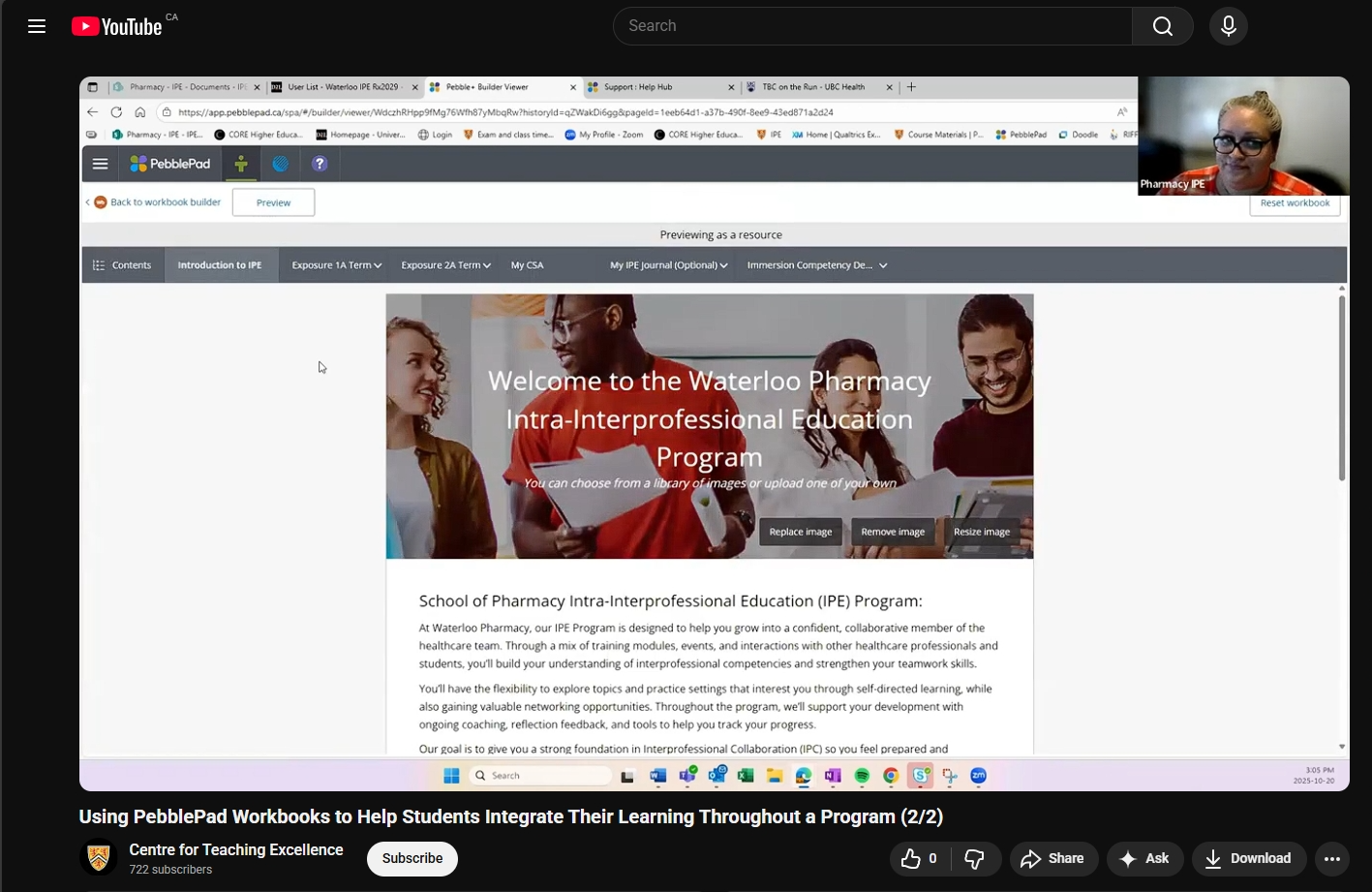The following resources have been made available with permission from their associated course instructors.
October 2025 – Instructional Innovation Week
Using PebblePad Workbooks to Help Students Integrate Their Learning Throughout a Program
A student’s university experience is often fragmented, with courses, service opportunities, and extracurricular activities seemingly unconnected to their program of study. Providing students with the means to integrate their learning often can be a challenge for university educators. In this session, Debbie Ellen and Erika Mutimura will share how they have used a PebblePad workbook to help address this challenge.
Debbie Ellen, Interprofessional Education Program Manager, School of Pharmacy

In this ~ 8 min video, Debbie outlines the School of Pharmacy’s Interprofessional Education IPE) program, and why PebblePad was chosen as the platform to support this program. (~8 min)
Erika Mutimura, Operations Coordinator, Interprofessional Education Program, School of Pharmacy

In this ~ 13 min video, Erika walks us through the workbook from the student’s perspective and reviews how PebblePad can help support administrators through with assignment set up, monitoring and reviewing submissions, providing feedback and communicating with students. Erika also shows how PebblePad helps students and instructors track students’ growth and development throughout the program.
May 2, 2025 – PebblePad Users Group
Engaging Students Through PebblePad Workbooks
In this session, Sandra Lopez-Rocha (Intercultural Learning Specialist, International Experience Centre) will share how she designed a PebblePad Workbook to engage students throughout the various components of the GLIDE (Global Learning, Intercultural Development, and Engagement) Certificate. In addition, Diya Drabu (Student Success Office co-op student) provided her experience reviewing the workbook from a student perspective. Participants had the opportunity to review the workbook and discuss the logistics of implementation as well as engage in a discussion on how they might use PebblePad workbook features to engage their students in their own courses and programs. (video) (PPTslides)
November 7, 2024 – PebblePad Users Group
Supporting Reflection with Journaling and GenAI

Each term, CTE co-op students use a PebblePad workbook and ePortfolio to reflect on their learning and track and showcase their growth and development during their co-op term. Beginning in Spring 2024, the co-op students have been testing the use of RIFF. RIFF is designed to help deepen the quality and depth of reflections. "While chatbots powered by generative AI are typically designed to answer questions and perform tasks, Riff focuses on asking learners thought-provoking questions to deepen their reflection process."
In this video, CTE co-op students, Charley Potter and Eleanor Walby share their experience completing their reflective journals assisted by RIFF, a GenAI tool developed a team at Stanford University’s d.school. Leticia Britos Cavagnaro (RIFF founder) to demonstrate RIFF and explain how it supports reflection.
October 19, 2023 – PebblePad Users Group
Reflecting, Articulating and Providing Evidence of Learning
PebblePad's 'Map My Learning' tool helps students reflect on, articulate, and provide concrete evidence of the skills and graduate attributes they develop, and map this to provided competencies. (Learn more about PebblePad’s Capabilities Feature.)
Reporting Features: PebblePad’s Reporting Features provide instructors with insights into their students’ progress and responses to provided prompts in templates and workbooks. Madeleine Noble shared how she used the reporting features in her Kin class. (PDF of slides)
Fostering Peer Review and Amplifying Feedback - Jennifer Yessis (School of Public Health Sciences) shared how she used PebblePad’s peer review feature and feedback template in her Master of Public Health Capstone course to scaffold the peer review process helping them collaboratively engage in critiquing each other's portfolios-in-progress. Students were then able to use the feedback to enhance the quality of their own final submissions. PebblePad’s reporting features support the process making it easy to compile and return the feedback. (Learn more about PebblePad peer review feature and feedback templates) (PDF of slides)
Supporting Self-Directed Learning – Leeann Ferries (Recreation and Leisure Studies) adapted a PebblePad workbook to support Student Led Individually Created Courses (SLICCs) framework. Prompts provided in the workbook helped students prepare more intentionally for their practicum by guiding them as they set personal learning goals, audited existing skills, created plans for developing skills they would need, reflected on their learning process, and honed their ability to self-evaluate. In essence, the workbook supported the cultivation of self-directed, lifelong learners. (PDF of slides)

April 26, 2023 - PebblePad Showcase Presentations
Examples of PebblePad Use at the University of Waterloo
Katherine Lithgow (Senior Educational Developer, Integrative and Experiential Learning, Centre for Teaching Excellence, University of Waterloo) shares examples illustrating how PebblePad supports integrative and experiential learning across campus. Examples include use of PebblePad to support student learning at course, program, and extra-curricular environments.
(video) (Course workbook example)
Using a PebblePad Workbook and ePortfolio to Track and Showcase Growth and Development on Co-operative Education Work Term
Brent McCready-Branch (first year co-op student with the Centre for Teaching Excellence at the University of Waterloo) tells us how the use of a PebblePad workbook journal helped him track and document his skills development during his co-op work term and helped him create an ePortfolio to showcase his skills to others.
(video)
Using PebblePad Feedback Templates and Reports to Facilitate Peer Review
Debbie Wang (Sessional Lecturer, Renison University College Social Development Studies) illustrates how she is able to use a combination of PebblePad feedback templates and report features to support peer review in her first year social development course.
(video)
Using PebblePad to Support Individual Reflection and Personal Learning in a Group Project in a Capstone Course
Jennifer Yessis (Associate Professor, School of Public Health, University of Waterloo) describes how she used PebblePad to support peer review, reflections, and portfolio creation to support student learning in a Capstone Course. She found that her students were better able to 1/ identify transferable skills they’d developed through the capstone project, 2/ recognize the value of peer feedback, 3/ articulate how they would apply transferable skills in the future and 4/ appreciate the value of reflection in enhancing their skill development.
(video)
Student wellbeing, belonging, success and employability
Shane Sutherland (Founder and CEO of PebblePad: an enterprise platform for supporting and scaffolding the learning journey) reviews several successful large-scale initiatives from PebblePad customers across the globe demonstrating how PebblePad can support students from orientation to graduation to employment addressing challenges that are common across the sector – nationally and internationally.
(video) (slides)
February 2023 PebblePad User’ Group Presentation
With support from a LITE Grant, Dr. Kelsey Johansen collaborated with CTE’s Liaison, Natalie Chow, to design an online course with the goal of engaging students in an experiential, outdoor, and place-based learning experience that fostered place attachment, pro-environmental attitudes, environmental concern, and nature stewardship. A PebblePad workbook was used to support formative and summative reflections, nature journaling and peer review activities.
Analysis of the weekly journal reflections, peer feedback, and final course assignments revealed how weekly nature journalling exercises supported students' immersion in nature, reflection on transferable skills, development of a growth mindset, and their mental health during the pandemic.
(video) (slides)
June 2022 PebblePad User’ Group Presentation
Although most often associated with supporting student learning in academic courses and programs, PebblePad can support learners at all stages of their learning journey. In this session, we heard from staff at two support units that have incorporated PebblePad workbooks into programming for grad students and staff here at the University of Waterloo. Kristin Brown shares how PebblePad workbooks have been integrated into the Certificate in University Teaching program. John Fedy and Chun Chih Chen discuss how PebblePad has been used in the OHD staff Leadership.
(video) (slides)
October 2021 PebblePad User’ Group Presentation
Jennifer Yessis (Instructor in the Master of Public Health (MPH) program in the School of Public Health Sciences) and Jahaira Aguila (student in the MPH program) discuss how PebblePad was used to support Group Projects in a Capstone Course in the MPH program. Using the PebblePad platform, students created a group portfolio, provided classmates with feedback, and received feedback from classmates to help improve their own project.
(video) (slides) (example of a group capstone portfolio)(See assignment details).
March 2021 PebblePad Users’ Group presentation
Laura Middleton, Kinesiology – Using PebblePad workbook to provide course content. Jenn Coggan, Nanotechnology Engineering – Using PP workbook to help students focus on the design process and associated required skills. Hsiao d’Ailly and Debbie Wang, Social Development Studies - Facilitating class presentations and a peer review process.
(video)
Reflecting on competencies, articulating transferable skills, and showcasing achievements
Diane Williams and Jennifer Yessis, School of Public Health in collaboration with Tania del Matto and Erin Hogan (United College, GreenHouse) (html)
Being a Reflexive Practitioner
Leeanne Ferries, Recreation and Leisure Studies, University of Waterloo (html)
Reflecting on Professional Skills Development
Jill Tomasson-Goodwin, Communication Arts, University of Waterloo (html)
Inspired Insights, Magnificent Failures, and Unanticipated Connections
Kate Willink - recorded at the University of Waterloo (html)
Facilitating Peer Review Process
Paul Wehr, Psychology, University of Waterloo (html)
Information Literacy for Research Psychology
Tim Ireland, Library, University of Waterloo (html)
Supporting Student Engagement and Creativity
Élise Lepage, French Studies, University of Waterloo (html)
Master of Social Work Capstone Project
Alice Schmidt Hanbidge, Renison University College, University of Waterloo (video)
Clinical Reflection for Healthcare Learners
Lisa Christian, Optometry Vision Science, University of Waterloo (video)
Supporting Student Development During Work Terms
Chris Rennick, Engineering, University of Waterloo (video)
Promoting Writing Skills in First-Year Biology Students
Marcel Pinheiro, Biology, University of Waterloo (video)
ePortfolios at the School of Accounting and Finance
Bob Sproule, Accounting and Finance, University of Waterloo (video)
ePortfolios in the Arts and Business Program Geoff Malleck, Economics, University of Waterloo (video)












